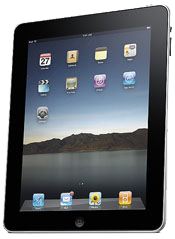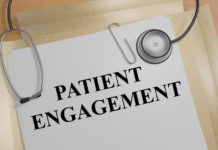iPad Effectiveness in Clinical Settings Understanding What Physicians and Patients Desire from mHealth Applications
Click Here for Additional Resources
A conversation with Douglas Elwood, MD, MBA, Director, GMI Strategy and Innovation at Bristol-Myers Squibb (see bio), about one of the country’s first and largest studies examining the utility of using iPads and other mobile devices in a real-time clinical setting, gathering insights on multiple variables associated with overall usage, app/website preferences, and aspects of daily clinical decision making and interactions.
Aired LIVE on:
Wednesday, July 25, 2012 Listen to internet radio with Pharmaguy on Blog Talk Radio
You may also visit this Pharma Marketing Talk Segment Page to listen to the audio podcast.
This show and ALL Pharma Marketing Talk shows are available as podcasts via PMT on iTunes (FREE!).
Background

In October, 2010, a team consisting of healthcare professionals in an NYU Langone Medical Center department, led by Dr. Elwood, launched one of the country’s first and largest studies examining the utility of using the iPad in a clinical setting. The process began with physicians, understanding through a baseline assessment what devices they use, how often, and other baseline characteristics. The researchers then provided over two dozen attendings and residents with iPads with preloaded apps/websites and began to monitor usage along a number of metrics.
The research has since expanded to explore how mobile devices are being used in a number of different ways, both among physicians and other healthcare professionals, as well as with patients. The researchers also directly studied patient/caregiver preferences both individually and as they relate to point of care opportunities. Topics include gaming, social media, patient satisfaction, and physician communication/education.
As companies flock to this space, it is critical to understand how both physicians and patients approach the topic of mHealth. While broad-based surveys are helpful to garner an appreciation of general adoption, they arguably do not provide the level of information required for companies to be successful in this space and to create tools that may help transform the industry. As policy measures like Comparative Effectiveness and Meaningful Use are increasingly implemented and ACOs and value-based reimbursement (among other expanding trends) develop, the conversion from ideation to execution becomes even more relevant. This research, and the insights gathered from it, in conjuncton with other similar studies, may help guide how the mHealth movement develops.
Questions/Topics Discussed
- Please give us a high-level overview of the current trends in mHealth. What types of devices are popular with physicians and what are future trends?
- Give us some background regarding the iPad Effectiveness Study you conducted whie at the Rusk, NYU Langone Medical Center
- How about reviewing some top-level results, including physician and patient attitude towards gaming, social media, patient satisfaction. point of care opportunities, and physician communication/education
- Finally, now that you are working the pharmaceutical industry, what insights should pharmaceutical marketers and medical education personnel take away from this study?
Guest Bios

Douglas Elwood, MD, MBA is a physician and an entrepreneur who has been involved in a number of ventures surrounding technology and targeted consumer efforts including an Internet company in the late 1990s and an mHealth company he co-founded in 2009. The latter was featured in two PWC mobile health industry reports for early successes. Doug remains on faculty at Rusk at the NYU Langone Medical Center where he started one of the country’s first and largest studies examining the iPad in clinical use and is leading multiple clinical studies exploring the utility of using mobile devices, as well as gamification, social media, and patient satisfaction. For patient satisfaction specifically, he led one of the largest real-time assessments done to this point. He currently works at Bristol-Myers Squibb identifying viable ways to improve the health experience through innovation. He also acts as an advisor to several mHealth companies and for Blueprint Health.
Doug completed a combined MD/MBA degree, is well published in several different clinical areas (including a novel written in the late hours of being on call), and has started an entertainment company focused on delivering more engaging content through the mobile channel.
Additional Resources









![6 Digital Tools at the Center of Healthcare Digitalization [INFOGRAPHIC]](http://ec2-54-175-84-28.compute-1.amazonaws.com/pharma-mkting.com/wp-content/uploads/2021/04/6DigitalTools_600px-100x70.jpg)




